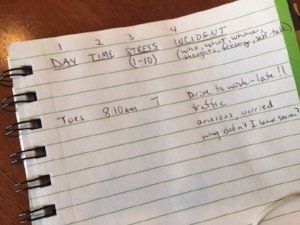How well do you know your enemy?
Class is in session!
If you need some personalized, creative ideas for reducing your stress (and who doesn't?), tune in for
the next few weeks. I will be challenging you to learn your best personal coping
skills.
My hope is for you to learn more about yourself and to incorporate some daily fun, stress-busting exercises to help you make your life a little more peaceful and rejuvenating and your work or school time more productive.
Everyone has stress, and we all know its effects can be brutal on our health, our mood, and our relationships. That's why we should all have 5 or 6 Go-To Stress Reducers we can use on a short term, daily basis. If your best way to feel better at the end of a long day is to grab chocolate or pour yourself a drink, think again! I'm here to challenge you to get more creative and learn that effective coping skills are NOT mind-altering or fat- producing substances!
This Week's Assignment will prepare you for an important science experiment: Collecting data on how stress affects YOU! That means I am challenging YOU to do 4 things:- Take intervention measures. Get yourself a small notebook, or set aside a place in your phone/tablet to make notes. In it you will record your observations and eventually formulate an outcome summary of the stress in your life. At the end of this process, you will have a list of stress reducers that you know work well for you personally. You will likely also have some good theories on what stresses you most and what your unhealthy coping skills are trying to tell you.
- Make 4 columns, as follows:
- DAY
- TIME
- STRESS (1-10)
- INCIDENT (WHO, WHAT, WHERE, THOUGHTS, FEELINGS, SELF-TALK)
- Everyday, record in your notebook or phone when it is that you are most stressed. What time of day is it? You may think you are well aware of this; but, take the time to really notice and record both your stressed and relaxed tendencies during the day. Is it first thing in the morning? Is it at the end of a long workday? Signs to look for include crankiness, difficulty concentrating, feeling flustered, depressed, keyed-up or fidgety, just to name a few. Notice what you are doing and feeling. What you are saying to yourself? Remember to record your observations. Also, notice when you are most calm. Who are those with you? What are you doing? What is your internal self-talk? Write this down. Using a scale of 1-10 (1 is most relaxed, 10 is most stressed), assign a numerical value for each instance you recorded. Good job! You are well on your way to formulating the outcome summary of the stress in your life!
- On a separate page, make 4 more columns, as follows:
- DAY
- TIME
- COPING STRATEGY
- OUTCOME (STRESS LEVEL 1-10)
On this page, you will note your current go-to stress reducers – both positive and negative. Do you reach for a cup of coffee/glass of wine? Do you talk to a friend or tend to get quiet? Do you rush or multitask in an effort to “get ahead”? Write these out in your notebook. Record how well each actually reduces your stress. Remember, use the 1-10 scale described above.
*EXTRA
CREDIT assignment
: Email me at jlatiolais@bellsouth.net
for a brief mood survey, then complete and date it. We'll complete it again at the end of Stress Management 101 for a
comparison.
Please add your comments below. Remember: In order to protect your privacy, please use a pseudonym instead of your real name.
